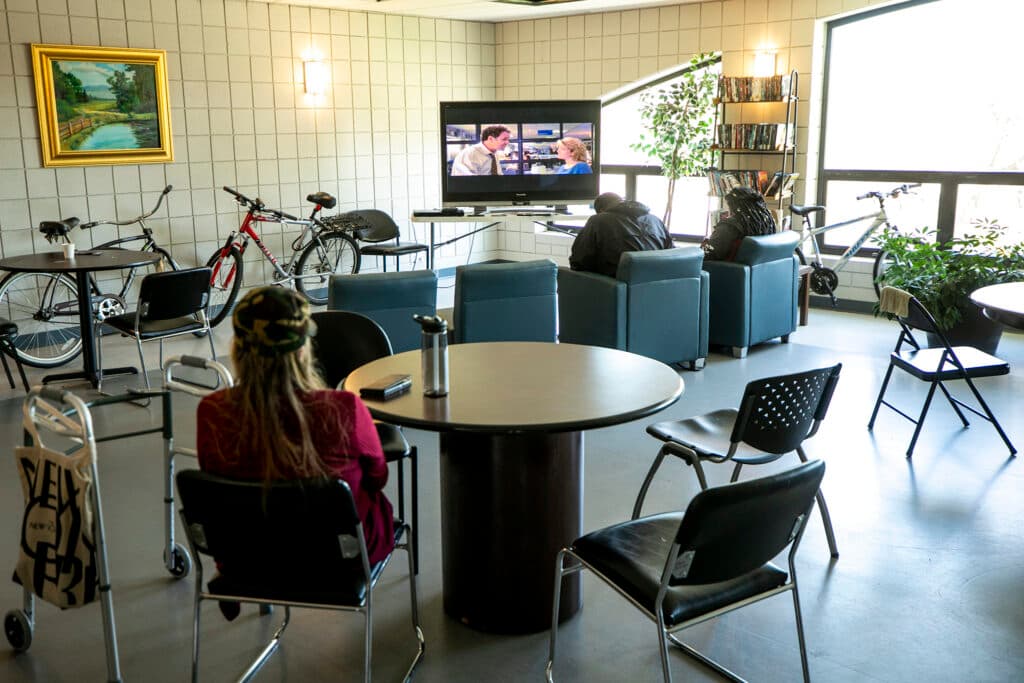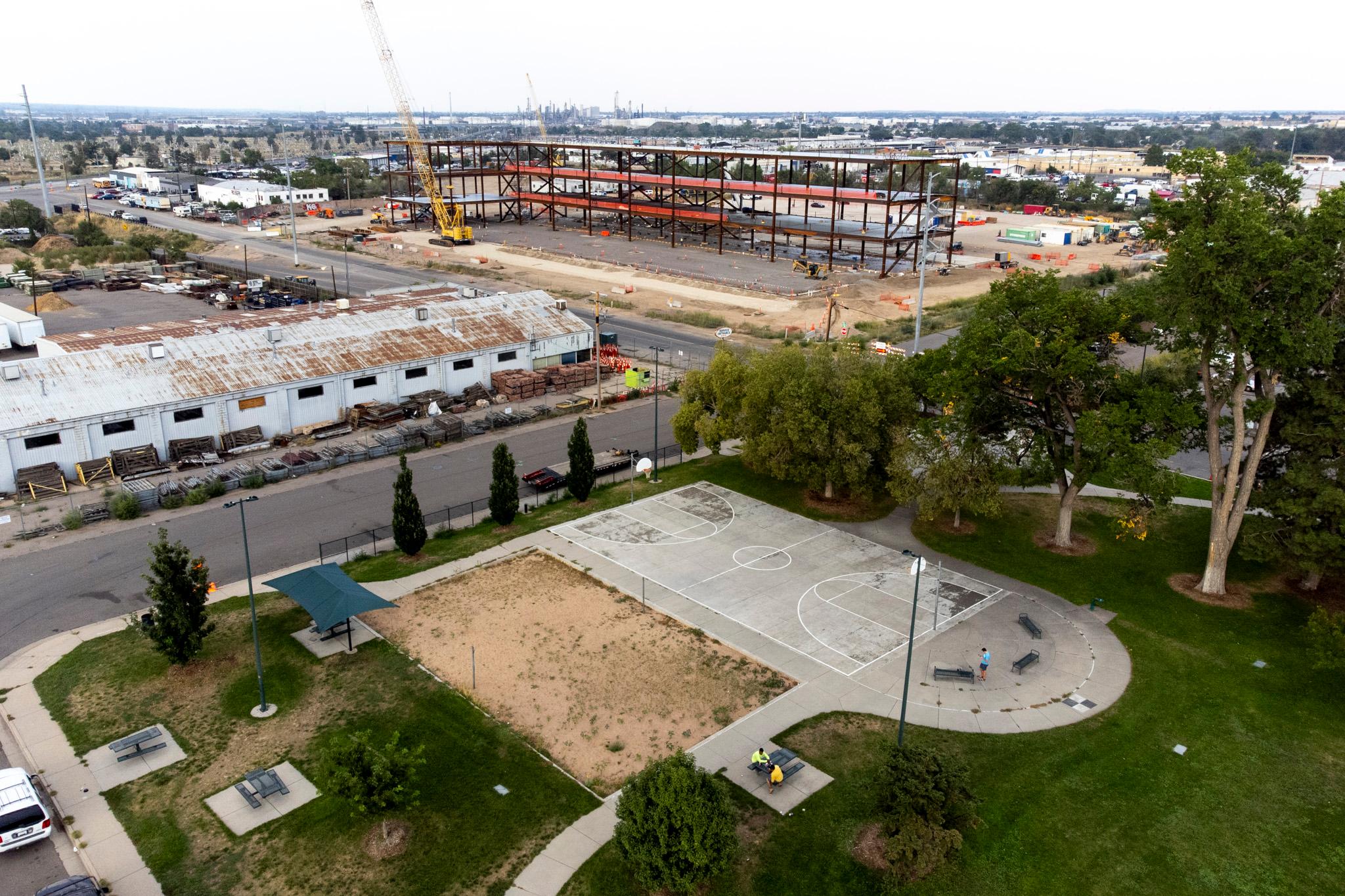Updated at 11:30 a.m. on Thursday, Nov. 13, 2025
As family homelessness rises in Denver, the city’s housing department is making changes to how it provides winter shelter for parents and their children.
The goal: to ensure Denver families can come in from the cold quickly — a pressing issue for the hundreds of unhoused families waitlisted for shelter over the past year.
Over the past year, Denverite has investigated cracks in the winter family shelter system.
An understaffed Salvation Army-run crisis hotline was overburdened with voice messages. People waited through cold nights for somebody to call them back. Families living in cars are deprioritized over those living outside in the family shelter system.
"When cold weather shelter is not in effect, it is true that some households may be prioritized greater than others," HOST spokesperson Derek Woodbury said in a statement. "However, it’s a different situation when cold weather shelter is activated, and at such time, Denver families residing in vehicles are certainly prioritized for shelter availability."
Yet last winter, families Denverite spoke with who were living in cars found themselves waiting for weeks for a callback on the emergency cold-weather shelter hotline, then the only way for families to come inside.
Now, the city is promising changes.
“We are making improvements to ensure Denver families have access to safe shelter during cold weather emergencies, while using our limited resources as effectively as possible,” Julia Marvin, a spokesperson for the Department of Housing Stability wrote.
The changes include:
- Opening a cold-weather emergency group shelter specifically for families
- Offering motel rooms and shelters on a walk-up basis for eligible Denver families on cold nights
- Expanding and improving the hotline for families seeking help
- Expanding the city’s budget to offer motel and hotel rooms in cold weather
- Establishing performance-based pay for the new nonprofit operating the existing Tamarac Family Shelter
Family homelessness is growing in Denver
Since 2022, the year before Mayor Mike Johnston took office, family homelessness has more than doubled — increasing by nearly 1,500 people, according to Johnston’s Department of Housing Stability (HOST), which acknowledges that an unknown number of families are living on the streets.
Even more are sleeping in cars, out of sight. And many others are doubled up in cramped homes.
More than 890 people were on the city’s waitlist for shelter at the beginning of October – roughly 240 families in total. But those are just the people actively asking the city for help.
How many families are actually experiencing unsheltered homelessness is impossible to say, a city housing leader recently said at a recent Denver City Council committee meeting.
Following Denverite’s reporting, the city made several concrete changes in how it plans to shelter families on cold nights over the coming winter.
In the past, there were no walk-up shelters for families on cold nights. Instead of going to a specific address, families were instructed to call the city’s Connection Center crisis hotline again and again, tying up the lines — sometimes with no response for weeks, families told Denverite.
After Denverite reported on the system, the Salvation Army changed its outgoing voice message and families were asked to leave a voicemail and wait for somebody to call them back.
If they were lucky enough to connect with someone, the center gave them hotel vouchers or instructions about accessing group winter shelters during cold-weather events. Otherwise, they were put on a long waitlist – one that still exists.

But now, for the first time under Johnston, unsheltered Denver families will be able to go to a homeless shelter in person during cold-weather events, and if staff decide they are eligible, they will receive emergency vouchers or entry to a group shelter.
Vouchers will no longer be distributed over the phone. Families — including children — will need to go to an intake site that will be announced when cold weather emergencies are declared.
The city will offer transportation to families that need help reaching the shelters.
“During (cold weather) activations, Denver families can receive transportation assistance by calling the Connection Center at 303-295-3366 or by going to any individual cold weather shelter site for transportation assistance,” Marvin wrote.
Families will be admitted to hotel rooms for as long as the supply lasts. When vouchers run out, the city will offer a specific cold-weather emergency group shelter for families.
“This is the first year that we will have a family congregate shelter as a backup in the instance we hit the voucher capacity,” Marvin said.
The city’s goal in opening a group family shelter for winter emergencies is to manage costs and meet urgent needs.
“Our limited dollars go much further when we can offer both non-congregate and congregate shelter options,” Marvin wrote. “We have expanded our capacity to issue vouchers by 15 percent but wanted to have a backup plan in the event we reach our capacity.”
The city is also investing more money in its Salvation Army-operated crisis hotline, the Connection Center. Staffing will be doubled, hours have been expanded, and it will be focused specifically on “literal homelessness,” or people living in uninhabitable conditions like under bridges or in their cars. In previous years, the call center has directly handled other types of issues related to homelessness beyond shelter and housing.
“A new phone tree will divert calls related to food insecurity or substance use to 211, ensuring families in crisis reach the right support more quickly,” Marvin wrote.
Last winter, single adults and families who were not “literally” homeless or were from outside Denver used the family shelter system — taking resources from residents of the city with children who needed help the most, according to HOST.
Between recent increases in eviction cases coupled with a drop in eviction prevention funding, a possible recession and other economic uncertainty, the housing department is bracing for an increase in family homelessness in 2026.
“To meet the anticipated increase in demand this winter, we’re improving our processes to ensure that this vital resource is reserved for Denver families who are truly without a safe place to stay,” Marvin said.
The city has made other changes to the family homelessness system.
After Denverite’s extensive reporting on health and safety concerns at Salvation Army-operated shelters, the city and the organization cut ties on several shelter contracts.
While some of the issues at the shelters were related to The Salvation Army, others fell under the direct oversight of the city itself. Contracts between the city and the organization went unsigned for months, and The Salvation Army operated the shelters without pay for the first half of 2025, putting the city’s largest provider in a financial bind.
Now, pending the council’s approval, Bayaud Works will take over the city’s Tamarac Family Shelter, where families stay in hotel rooms.
“Under a new performance-based contract, Bayaud Works will be compensated based on key outcomes that improve shelter operations and help residents transition out of homelessness,” Marvin wrote.
Additionally, the city is investing more in rapid rehousing to shorten shelter stays and support families looking for secure and stable homes.
“Overall, these improvements are about strengthening the system — ensuring Denver’s family shelters are ready to meet demand, focused on the families most in need, and equipped to help them move toward stability,” Marvin wrote.
More families are falling into homelessness than the city is able to help.
Families do not have a right to shelter in the city of Denver, and there are simply not enough beds, rooms or hotel vouchers — much less housing vouchers — to meet the year-round demand.
If you are evicted or lose your house, and you are not an individual, there is nowhere immediately for you to go, unless it’s cold enough to activate emergency shelters. The city’s Tamarac Family Shelter is most often full, with a long waitlist.
Massachusetts is the only state in the country where families have a right to shelter, and New York City is one of the few cities where it’s true, though both those laws are being challenged.
There are no plans to build an additional family shelter with individual rooms. And though the Department of Housing Stability acknowledges even a group shelter would be better than nothing, there are no such projects in the works.

When considering budget amendments to Mayor Mike Johnston’s reduced 2026 budget, a majority of council members voted against opening more shelter capacity for families.
While Jeff Kositsky, the deputy director for shelter and stability for Denver's housing department, acknowledges there is “no silver bullet” fix to family homelessness, he said there are concrete things the city could do now:
- Prevent homelessness through sufficient emergency rental assistance to meet the demand in an era with record-high eviction cases.
- Speed up rapid rehousing housing — a hard thing to do when federal housing vouchers do not exist and the city has far too few to meet the need.
- Create a group family shelter, so nobody has to sleep outside while they wait for individual rooms to open up in family shelters.
Since 2022, the city has nearly doubled its family shelter capacity, but there are only 10 vacant units. As the city spends more on solving family homelessness, the problem keeps increasing.
“It's like a bathtub that's always filling up,” Kositsky said. “If we don't slow down the water … the bathtub is going to keep overflowing.”
Editor's note: This article was updated Nov. 13, 2025 at 11:30 a.m. with further comment and information from the city.













